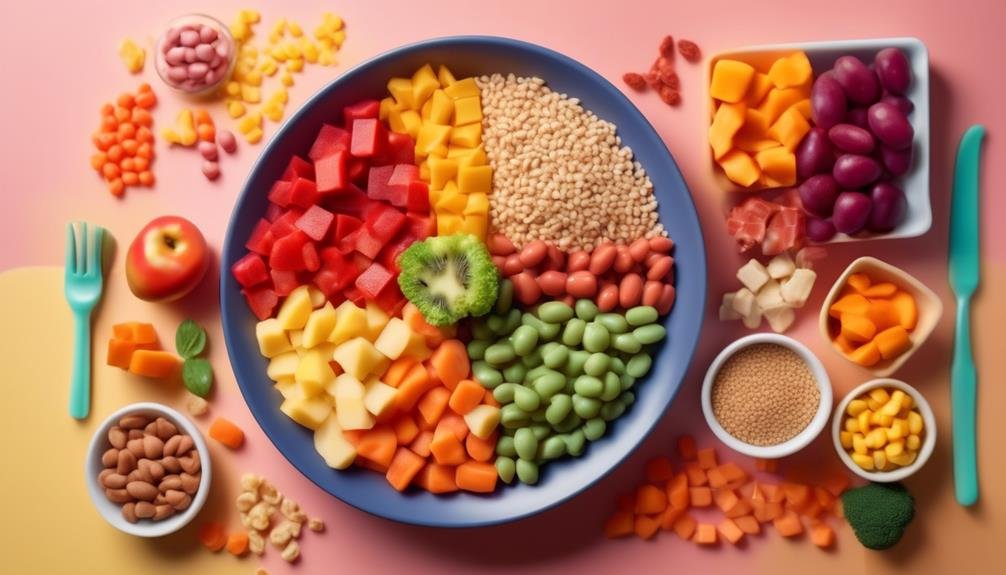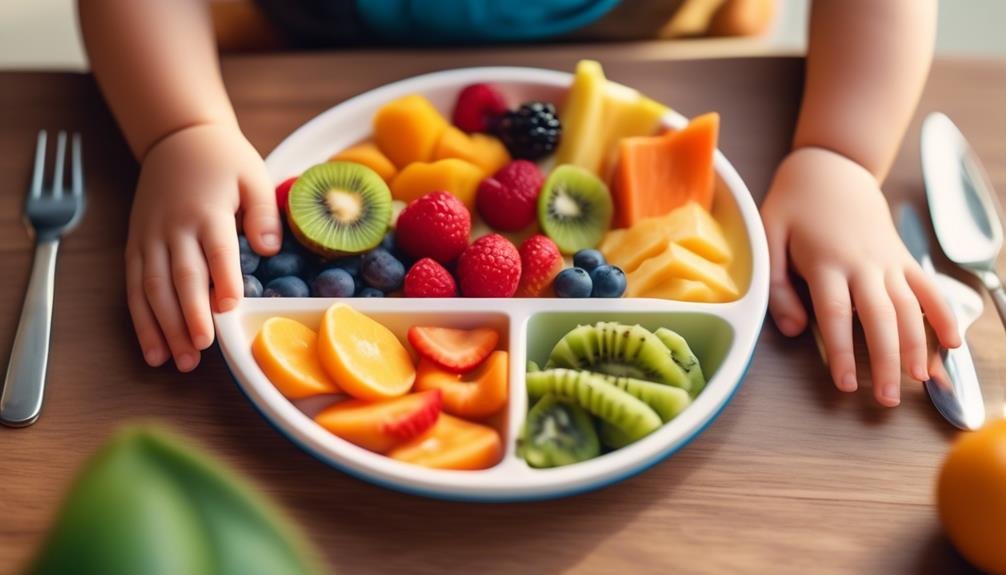"Cherishing Little Steps - A Haven for Baby and Family Journeys"
Meal Planning for Toddlers
They say, 'You are what you eat.' This old adage holds true, especially when it comes to the health and development of your toddler.
As a parent, you want to ensure that your little one is getting all the necessary nutrients for their growth and well-being. But with so many factors to consider, meal planning for toddlers can be quite a challenge. From understanding their nutritional needs to dealing with picky eaters, there's a lot to navigate.
However, fear not! In this discussion, we will explore various aspects of meal planning for toddlers, providing you with smart strategies, quick recipes, and helpful tips to make mealtimes enjoyable and nutritious for your little one.
So, let's dive in and discover the secrets to successful toddler meal planning together!
Key Takeaways
- Meal planning for toddlers ensures a well-balanced diet for healthy growth and development.
- Including a variety of food groups in the meal plan provides a range of nutrients.
- Involving toddlers in the meal planning process increases their interest and enthusiasm for mealtime.
- Introducing new flavors, textures, and foods helps expand their palate and promotes healthy eating habits.
Importance of Meal Planning

Meal planning is an essential step in ensuring that your toddler receives a well-balanced diet throughout the week. By taking the time to plan your toddler's meals, you can ensure that they're getting all the nutrients they need for healthy growth and development. Meal planning also helps you save time and money, as you can make a shopping list and buy only what you need.
To get started with meal planning for your toddler, here are a few tips to keep in mind. First, try to include a variety of foods from different food groups in each meal. This will help provide your toddler with a range of nutrients. Second, plan meals that are easy to prepare and can be made in advance. This will save you time during busy weekdays. Lastly, involve your toddler in the meal planning process. Let them choose some of the foods they want to eat, which will increase their interest and enthusiasm for mealtime.
The benefits of meal planning for your toddler are numerous. It ensures that they're getting a balanced diet, which is essential for their growth and development. It also helps establish healthy eating habits from an early age. Additionally, meal planning saves you time and reduces stress by eliminating the need to figure out what to cook every day. So, take the time to plan your toddler's meals, and enjoy the many benefits it brings.
Nutritional Needs of Toddlers
Toddlers have specific nutritional needs that are crucial for their growth and development. Ensuring that they receive a balanced diet is essential, especially considering the mealtime struggles that many parents face. Here are some important points to keep in mind when it comes to meeting your toddler's nutritional needs:
- Variety is key: Introduce a wide range of foods to your toddler's diet to provide them with the necessary nutrients. Include fruits, vegetables, whole grains, lean proteins, and dairy products.
- Snack smart: Healthy snack options can help bridge the nutritional gaps between meals. Opt for snacks like sliced fruits, yogurt, cheese, or whole grain crackers. Avoid sugary treats and opt for nutrient-dense options instead.
- Offer small, frequent meals: Toddlers have small stomachs and may prefer to eat smaller meals throughout the day. Offer them regular meals and snacks to ensure they're adequately nourished.
- Focus on nutrient-dense foods: Toddlers need foods that are rich in nutrients to support their growth. Include foods like avocados, eggs, nut butter, and whole grains in their diet.
- Stay hydrated: Toddlers often forget to drink enough fluids, so it's important to offer them water or milk regularly throughout the day to keep them hydrated.
Creating a Balanced Meal Plan

When planning meals for your toddler, it is important to ensure a balance of nutrients to support their growth and development. Creating a balanced meal plan can be made easier with some meal prep tips and by including toddler-approved snacks. To help you get started, here is a simple 2-column, 3-row table that outlines the components of a balanced meal plan for your toddler:
| Food Group | Examples |
|---|---|
| Protein | Chicken, fish, tofu, beans |
| Fruits | Apples, berries, oranges |
| Vegetables | Carrots, broccoli, spinach |
| Grains | Whole wheat bread, rice, pasta |
| Dairy | Milk, yogurt, cheese |
| Healthy Fats | Avocado, nut butter, olive oil |
Make sure to include at least one food from each group in your toddler's meal plan. This will ensure they get a variety of nutrients. Offering a wide range of colors, flavors, and textures will also make mealtime more enjoyable for your little one. To make meal prep easier, try batch cooking and freezing individual portions. This way, you can simply thaw and reheat when needed. Additionally, keep a stock of toddler-approved snacks on hand, such as sliced fruits, whole grain crackers, or yogurt cups. These snacks can be offered between meals to keep your toddler satisfied and nourished throughout the day.
Incorporating Variety in Toddler Meals
To introduce more variety into your toddler's meals, consider incorporating new flavors and textures that will keep mealtime exciting for them. Mealtime challenges can arise when your toddler becomes picky or bored with their food options, so it's important to introduce a range of different foods to keep them interested and engaged. Here are some ideas to help you incorporate variety into your toddler's meals:
- Offer a variety of fruits and vegetables: Try introducing different types of fruits and vegetables to expose your toddler to new flavors and textures. Offer a mix of raw and cooked options for added variety.
- Try new grains and proteins: Incorporate different types of grains like quinoa, couscous, or millet into your toddler's meals. Experiment with different protein sources such as tofu, lentils, or fish to diversify their nutrient intake.
- Get creative with presentation: Presenting food in fun and appealing ways can make mealtime more exciting for your toddler. Use cookie cutters to create fun shapes, arrange food in a colorful and visually appealing manner, or let your toddler help with meal preparation to get them more excited about trying new foods.
- Introduce toddler-friendly snacks: Snacks can be a great way to introduce new flavors and textures. Offer a variety of healthy options such as sliced fruits, yogurt, whole grain crackers, or veggie sticks with dip.
- Involve your toddler in meal planning: Letting your toddler have a say in what they eat can make mealtime more enjoyable for them. Offer them choices and involve them in meal planning and preparation to encourage their interest in trying new foods.
Smart Strategies for Picky Eaters

If your toddler is a picky eater, there are smart strategies you can implement to encourage them to try new foods and expand their palate. Encouraging healthy eating habits in picky eaters can be challenging, but with the right strategies, it's possible to overcome food aversions and sensory issues.
One effective strategy is to involve your toddler in meal planning and preparation. Let them choose fruits and vegetables at the grocery store and allow them to help wash and chop them. This hands-on approach can make them more interested in trying new foods.
Another strategy is to make meals fun and appealing. Use colorful and creative presentations, such as arranging fruits and vegetables into fun shapes or making smiley faces with food. Additionally, try serving new foods alongside familiar ones. This can help your toddler feel more comfortable and willing to try something new.
It's important to be patient and persistent when introducing new foods. Offer a variety of options and consistently expose them to different tastes and textures. Remember, it may take several attempts before your picky eater warms up to a new food.
Quick and Easy Toddler-Friendly Recipes
Now let's move on to quick and easy toddler-friendly recipes, perfect for introducing new tastes and textures to your picky eater. Here are five delicious and nutritious options that your toddler is sure to love:
- Mini Veggie Quesadillas: Spread some mashed avocado on a whole wheat tortilla, top with grated cheese and finely chopped vegetables like bell peppers and spinach. Fold in half and lightly toast until the cheese melts. Cut into bite-sized pieces for easy snacking.
- Fruit Kabobs: Thread chunks of watermelon, pineapple, and berries onto skewers for a colorful and fun snack. You can even let your toddler help assemble them, making it a fun mealtime activity.
- Yogurt Parfait: Layer Greek yogurt, granola, and fresh fruit in a small cup or bowl. This tasty treat is packed with protein and vitamins.
- Cheesy Broccoli Bites: Steam some broccoli florets until tender, then mash them with grated cheese and breadcrumbs. Shape into small patties and bake until golden brown. These bite-sized snacks are packed with nutrients and are perfect for little hands.
- Banana Pancakes: Mash a ripe banana in a bowl, add an egg, and mix until combined. Cook small spoonfuls of the mixture in a non-stick pan until golden brown. These fluffy pancakes are a great way to sneak in some fruit and make a delicious breakfast or snack option.
These toddler-friendly recipes aren't only quick and easy to prepare, but they're also packed with nutrients to help your little one grow. Enjoy exploring new flavors and textures together during mealtime activities!
Meal Prepping for Busy Parents

Busy parents can save time and ensure their toddlers have nutritious meals by incorporating meal prepping into their weekly routine. Meal prepping can be a game-changer for parents who are constantly on the go. Here are some meal prepping tips and time-saving hacks to make your life easier.
First, plan your meals in advance. Take some time at the beginning of each week to create a meal plan for your toddler. This will help you stay organized and ensure you have all the ingredients you need on hand.
Next, batch cook. Cook large quantities of toddler-friendly meals and snacks and portion them out into individual servings. You can then freeze them for later use. This saves you time during the week and ensures that you always have a healthy meal ready to go.
Invest in good quality storage containers. Having the right containers makes meal prepping a breeze. Look for containers that are easy to stack, microwave-safe, and leak-proof.
Lastly, get your toddler involved. Let them help you with meal prepping by washing fruits and vegetables, stirring ingredients, or even packing their own lunch. Not only does this save you time, but it also teaches your child about healthy eating habits.
Incorporating meal prepping into your routine can be a game-changer for busy parents. By following these meal prepping tips and time-saving hacks, you can save time, ensure your toddler has nutritious meals, and have one less thing to worry about during your busy week.
Introducing New Foods to Toddlers
When introducing new foods to toddlers, it's important to start with small portions and gradually increase the variety in their diet. Toddlers can be picky eaters, so it's crucial to approach this process with patience and creativity. Here are some tips to help you navigate introducing new foods to your little one:
- Watch out for food allergies and sensitivities: Before introducing any new food, it's essential to be aware of potential allergies or sensitivities. Start with common allergens like eggs, nuts, dairy, and seafood, and monitor your child for any adverse reactions.
- Introduce texture and finger foods: As your toddler grows, introducing different textures and finger foods can help develop their eating skills. Start with soft foods like mashed bananas or cooked vegetables and gradually progress to more challenging textures like diced fruits or cooked pasta.
- Offer a variety of flavors: Introducing a wide range of flavors early on can help expand your toddler's palate. Include different fruits, vegetables, grains, and proteins in their meals to expose them to diverse tastes and textures.
- Be a role model: Toddlers often mimic their parents' eating habits, so make sure to eat a variety of foods yourself. Seeing you enjoy different foods can encourage them to try new things.
- Stay positive and patient: It may take several attempts before your toddler accepts a new food. Stay positive, offer praise for their efforts, and be patient. Remember, it's a process, and every small step counts.
Tips for Successful Mealtime With Toddlers

To ensure successful mealtimes with your toddler, it's important to create a positive and engaging environment that encourages healthy eating habits. Mealtime struggles can be common with toddlers, but with the right feeding techniques, you can make it a more enjoyable experience for both of you.
Firstly, make sure to set a regular schedule for meals and snacks. Having consistent meal times helps your toddler develop a routine and reduces the chances of them getting too hungry or too full between meals. This can make them more willing to try new foods and eat a variety of nutritious options.
Secondly, create a pleasant atmosphere during meals. Turn off distractions like the TV or electronic devices and focus on the meal. Sit together at the table and engage in conversation. Encourage your toddler to participate by asking them questions about their day or involving them in food preparation. This creates a positive and interactive experience around food.
Next, be a role model by eating healthy foods yourself. Toddlers are more likely to try new foods when they see others enjoying them. Offer a variety of foods, including fruits, vegetables, whole grains, and lean proteins. Avoid pressuring your toddler to eat everything on their plate and instead let them listen to their hunger and fullness cues.
Frequently Asked Questions
How Can I Encourage My Toddler to Try New Foods?
You can encourage your toddler to try new foods by finding ways to introduce new flavors and creating a positive mealtime environment. It's important to make it a fun and enjoyable experience for them.
What Are Some Tips for Dealing With a Picky Eater?
When dealing with a picky eater, there are some strategies you can try to make mealtimes less of a battle. It's important to stay patient, offer a variety of foods, involve them in meal planning, and provide positive reinforcement.
How Can I Ensure My Toddler Is Getting Enough Nutrients in Their Meals?
To ensure your toddler gets enough nutrients, focus on encouraging healthy eating habits by offering a variety of foods. Be mindful of managing food allergies and consult with a pediatrician for guidance.
Are There Any Quick and Easy Meal Prep Ideas for Toddler Meals?
You can easily prepare quick and healthy meals for your toddler. Try making mini sandwiches, fruit skewers, or veggie wraps. For snack time, offer toddler-friendly options like yogurt bites or sliced avocado.
How Can I Create a Balanced Meal Plan for My Toddler While Considering Their Nutritional Needs?
To create a balanced meal plan for your toddler, it's crucial to consider their nutritional needs. Start by incorporating a variety of food groups in their meals and balancing portion sizes to meet their energy requirements.
Conclusion
In conclusion, meal planning for toddlers is crucial for their overall health and development. By understanding their nutritional needs and creating balanced meal plans, parents can ensure that their toddlers are getting the necessary nutrients.
Incorporating variety in their meals and using smart strategies for picky eaters can help in introducing new foods and making mealtime enjoyable.
With quick and easy toddler-friendly recipes and meal prepping, busy parents can save time and provide nutritious meals for their little ones.



Your point of view caught my eye and was very interesting. Thanks. I have a question for you.